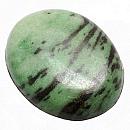|
Click on a letter above to view the list of gems. |
|
|
|
|
|
|
|
|
Tschermakite
|
|
| | |
| Discovered in 1945. IMA status: Valid (pre-IMA; Grandfathered) | ||
|
| ||
|
Chemistry |
|
|
| |
|
Ca2Mg3Al3Fe3+Si6O22(OH)2 | |
|
|
Calcium Magnesium Aluminum Iron Silicate Hydroxide |
|
Molecular Weight: |
844.38 gm |
|
Composition: |
Calcium |
9.49 % |
Ca |
13.28 % |
CaO |
|
|
Magnesium |
8.64 % |
Mg |
14.32 % |
MgO |
|
|
Aluminum |
9.59 % |
Al |
18.11 % |
Al2O3 |
|
|
Iron |
6.61 % |
Fe |
9.46 % |
Fe2O3 |
|
|
Silicon |
19.96 % |
Si |
42.69 % |
SiO2 |
|
|
Hydrogen |
0.24 % |
H |
2.13 % |
H2O |
|
|
Oxygen |
45.48 % |
O |
|
|
|
|
|
100.00 % |
|
100.00 % |
= TOTAL OXIDE |
|
|
|
||||
|
Classification |
|
|
| |
|
Silicates (Germanates) | |
|
8/F.10-60 | |
|
|
9 : SILICATES (Germanates)
|
|
Related to: |
Amphibole Group. Calcic Clino-Amphibole Subgroup. Tschermakite - Ferrotschermakite Series. |
|
Synonyms: |
Tschermakitic hornblende, Aluminotschermakite |
|
|
|
|
Crystal Data |
|
|
|
|
|
As prismatic crystals; as reaction rims on other minerals. |
|
|
Simple or multiple twinning || {100}. |
|
|
|
|
|
Physical Properties |
|
|
|
|
|
Perfect on {110}, intersecting at 56º and 124º; partings on {100}, {001}. |
|
|
Conchoidal |
|
|
Brittle |
|
|
5.0 - 6.0 |
|
|
3.15 (g/cm3) |
|
|
None |
|
|
Not Radioactive |
|
|
|
|
|
Optical Properties |
|
|
|
|
|
Medium Green to dark Green to Green-Black to Black, Brown (rare). |
|
|
Transparent to Opaque |
|
|
Vitreous |
|
|
1.68 - 1.698 Biaxial ( + ) or ( - ) |
|
|
0.0180 |
|
|
Strong; r > v |
|
|
Visible to Distinct; in greens and browns |
|
|
|
|
|
Occurances |
|
|
|
|
|
Geological Setting: |
From eclogites and other ultramafic igneous rocks, and in medium- to high-grade metamorphic rocks, typically amphibolites. |
|
Common Associations: |
Kyanite, Garnet |
|
Common Impurities: |
Ti, Mn, Na, K, H2O |
|
Type Locality: |
(possibly Bamle, Norway) |
|
Year Discovered: |
1945 |
|
View mineral photos: | |
|
|
|
|
More Information |
|
|
|
|
|
| |
|
|
|
|
Probably
widespread. Well-studied material from: Hurry Inlet,
Fiskenæsset, Greenland. At Glenelg and Knockormal, Ayrshire,
Scotland. From Lake Kutemajärvi, Orivesi, and Perniö,
Finland. In France, from Le Viala du Tarn, Aveyron.
From the central Bug region, Ukraine. |
|
|
We
have not photographed our Tschermakite gems. Please
check back soon. |
